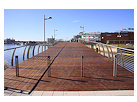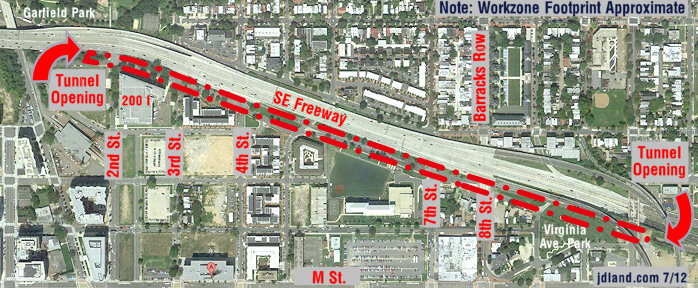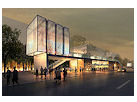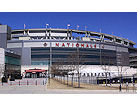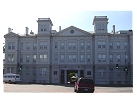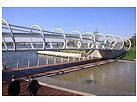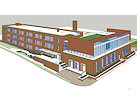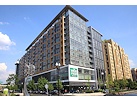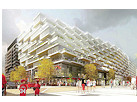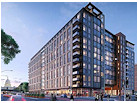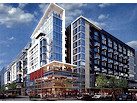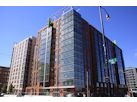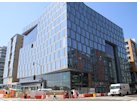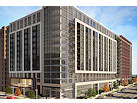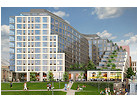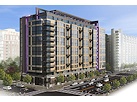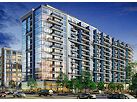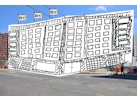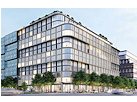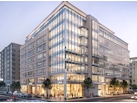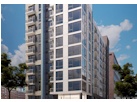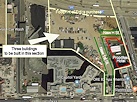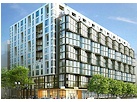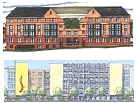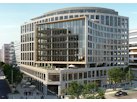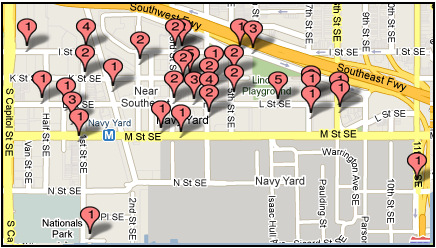|
| ||||||||||||||||||||
Please note that JDLand is no longer being updated.
peek >>
Near Southeast DC Past News Items
- Full Neighborhood Development MapThere's a lot more than just the projects listed here. See the complete map of completed, underway, and proposed projects all across the neighborhood.
- What's New This YearA quick look at what's arrived or been announced since the end of the 2018 baseball season.
- Food Options, Now and Coming SoonThere's now plenty of food options in the neighborhood. Click to see what's here, and what's coming.
- Anacostia RiverwalkA bridge between Teague and Yards Parks is part of the planned 20-mile Anacostia Riverwalk multi-use trail along the east and west banks of the Anacostia River.
- Virginia Ave. Tunnel ExpansionConstruction underway in 2015 to expand the 106-year-old tunnel to allow for a second track and double-height cars. Expected completion 2018.
- Rail and Bus Times
Get real time data for the Navy Yard subway, Circulator, Bikeshare, and bus lines, plus additional transit information. - Rail and Bus Times
Get real time data for the Navy Yard subway, Circulator, Bikeshare, and bus lines, plus additional transit information. - Canal ParkThree-block park on the site of the old Washington Canal. Construction begun in spring 2011, opened Nov. 16, 2012.
- Nationals Park21-acre site, 41,000-seat ballpark, construction begun May 2006, Opening Day March 30, 2008.
- Washington Navy YardHeadquarters of the Naval District Washington, established in 1799.
- Yards Park5.5-acre park on the banks of the Anacostia. First phase completed September 2010.
- Van Ness Elementary SchoolDC Public School, closed in 2006, but reopening in stages beginning in 2015.
- Agora/Whole Foods336-unit apartment building at 800 New Jersey Ave., SE. Construction begun June 2014, move-ins underway early 2018. Whole Foods expected to open in late 2018.
- New Douglass BridgeConstruction underway in early 2018 on the replacement for the current South Capitol Street Bridge. Completion expected in 2021.
- 1221 Van290-unit residential building with 26,000 sf retail. Underway late 2015, completed early 2018.
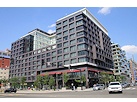
- NAB HQ/AvidianNew headquarters for National Association of Broadcasters, along with a 163-unit condo building. Construction underway early 2017.
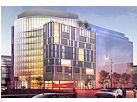
- Yards/Parcel O Residential ProjectsThe Bower, a 138-unit condo building by PN Hoffman, and The Guild, a 190-unit rental building by Forest City on the southeast corner of 4th and Tingey. Underway fall 2016, delivery 2018.
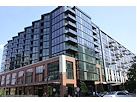
- New DC Water HQA wrap-around six-story addition to the existing O Street Pumping Station. Construction underway in 2016, with completion in 2018.
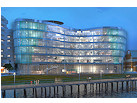
- The Harlow/Square 769N AptsMixed-income rental building with 176 units, including 36 public housing units. Underway early 2017, delivery 2019.
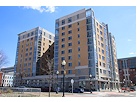
- West Half Residential420-unit project with 65,000 sf retail. Construction underway spring 2017.
- Novel South Capitol/2 I St.530ish-unit apartment building in two phases, on old McDonald's site. Construction underway early 2017, completed summer 2019.
- 1250 Half/Envy310 rental units at 1250, 123 condos at Envy, 60,000 square feet of retail. Underway spring 2017.
- Parc Riverside Phase II314ish-unit residential building at 1010 Half St., SE, by Toll Bros. Construction underway summer 2017.
- 99 M StreetA 224,000-square-foot office building by Skanska for the corner of 1st and M. Underway fall 2015, substantially complete summer 2018. Circa and an unnamed sibling restaurant announced tenants.
- The Garrett375-unit rental building at 2nd and I with 13,000 sq ft retail. Construction underway late fall 2017.
- Yards/The Estate Apts. and Thompson Hotel270-unit rental building and 227-room Thompson Hotel, with 20,000 sq ft retail total. Construction underway fall 2017.
- Meridian on First275-unit residential building, by Paradigm. Construction underway early 2018.
- The Maren/71 Potomac264-unit residential building with 12,500 sq ft retail, underway spring 2018. Phase 2 of RiverFront on the Anacostia development.
- DC Crossing/Square 696Block bought in 2016 by Tishman Speyer, with plans for 800 apartment units and 44,000 square feet of retail in two phases. Digging underway April 2018.
- One Hill South Phase 2300ish-unit unnamed sibling building at South Capitol and I. Work underway summer 2018.
- New DDOT HQ/250 MNew headquarters for the District Department of Transportation. Underway early 2019.
- 37 L Street Condos11-story, 74-unit condo building west of Half St. Underway early 2019.
- CSX East Residential/Hotel225ish-unit AC Marriott and two residential buildings planned. Digging underway late summer 2019.
- 1000 South Capitol Residential224-unit apartment building by Lerner. Underway fall 2019.
- Capper Seniors 2.0Reconstruction of the 160-unit building for low-income seniors that was destroyed by fire in 2018.
- Chemonics HQNew 285,000-sq-ft office building with 14,000 sq ft of retail. Expected delivery 2021.
2398 Blog Posts Since 2003
Go to Page: 1 | ... 7 | 8 | 9 | 10 | 11 | 12 | 13 | 14 | 15 ... 240
Search JDLand Blog Posts by Date or Category
Go to Page: 1 | ... 7 | 8 | 9 | 10 | 11 | 12 | 13 | 14 | 15 ... 240
Search JDLand Blog Posts by Date or Category
Today WMATA sent out a press release touting a new web page highlighting its "dozens" of current and recently completed Transit Oriented development projects. And lo and behold, on the page for the Navy Yard "Chiller Plant" site on the southwest corner of Half and L, we find out that Metro has been negotiating a development agreement with Donatelli Development since the summer of 2008 (!) to build an 84-unit apartment building with ground-floor retail on the 14,000-square-foot site. Metro would continue to own the land and would receive lease income from the site, while Donatelli would be responsible for incorporating two new, larger, 350-ton chillers within the project (so that everyone down in both the Navy Yard and Waterfront-SEU Metro stations stay nice and climate-controlled).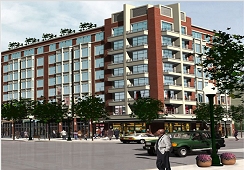 Metro says that this stalled development agreement is now "expected to be executed in the summer of 2010," with a lease between the companies to be signed about 18 months after that, once all development and construction permits are obtained. They say "late 2013" is when the project would open. At right is a rendering from the WMATA site of the proposed building. (Note that the footprint of this project does not include the cab company building just to the west at 37 L.)
Metro says that this stalled development agreement is now "expected to be executed in the summer of 2010," with a lease between the companies to be signed about 18 months after that, once all development and construction permits are obtained. They say "late 2013" is when the project would open. At right is a rendering from the WMATA site of the proposed building. (Note that the footprint of this project does not include the cab company building just to the west at 37 L.)
 Metro says that this stalled development agreement is now "expected to be executed in the summer of 2010," with a lease between the companies to be signed about 18 months after that, once all development and construction permits are obtained. They say "late 2013" is when the project would open. At right is a rendering from the WMATA site of the proposed building. (Note that the footprint of this project does not include the cab company building just to the west at 37 L.)
Metro says that this stalled development agreement is now "expected to be executed in the summer of 2010," with a lease between the companies to be signed about 18 months after that, once all development and construction permits are obtained. They say "late 2013" is when the project would open. At right is a rendering from the WMATA site of the proposed building. (Note that the footprint of this project does not include the cab company building just to the west at 37 L.)(And yes, I'm hanging my head in shame for not knowing about this. I knew that Metro was negotiating with *someone*, but had never heard who, and figured it fell through as time passed with no announcement. Maybe I'll take all of August off as punishment.)
|
Comments (0)
|
A few bullets for a warm Monday:
* DCHA is holding a Capper/Carrollsburg Hope VI task force meeting on Tuesday at 6 pm at 400 M Street SE. The agenda includes an overall status report, an update on the (stalled) community center, outreach efforts to former residents, and a presentation on the community benefits fund. "Hope VI" refers to the $34.9 million HUD grant awarded to DC in 2001 to replace the 700 Capper/Carrollsburg units with an equal number of new public housing units as well as another 800-plus market- and workforce-rate units, which has so far begat Capper Seniors #1, 400 M, and Capitol Quarter, along with plans for another five apartment buildings and two office buildings still in the pipeline.
* The Alcohol Beverage Regulation Administration has officially posted the application by Harry's of SE & SW to open a liquor store at New Jersey and I in the ground floor of 909 New Jersey. The hearing date is set for August 23, with any protests or other "petitions" needing to be filed by August 9 (happy birthday to me!). More about Harry's plans here.
* Via Norm Metzger, this from Saturday's PSA 105 meeting: "A suspected car thief was arrested near 3rd and K Street SE. Vigilant neighbors reported suspicious activity and were able to stop a crime in progress."
|
Comments (0)
More posts:
909 New Jersey, Alcohol/Liquor Licenses, Capper, Community Center, crime, Harry's Reserve, Retail
|
Readers may be familiar with the map a little ways down the right side of the JDLand home page, showing recent crimes in the neighborhood (along with a larger one showing more crime statistics for the area since 2005). However, there's another map and dataset I've wanted to build for a long time, that I'm finally launching today. It's not anything to really celebrate, however: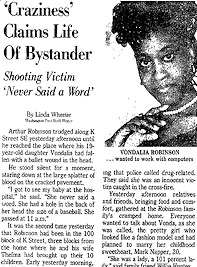 It turns me into an old codger to say it, but it's really true: those of you who didn't live in the DC area in the late 1980s and 1990s really have no concept of what Washington and its residents went through in those years. Even though large swaths of the city were considered "safe," with the bulk of the epidemic crime happening in certain neighborhoods, everyone was affected by the unrelenting drumbeat of murders and violence.
It turns me into an old codger to say it, but it's really true: those of you who didn't live in the DC area in the late 1980s and 1990s really have no concept of what Washington and its residents went through in those years. Even though large swaths of the city were considered "safe," with the bulk of the epidemic crime happening in certain neighborhoods, everyone was affected by the unrelenting drumbeat of murders and violence. 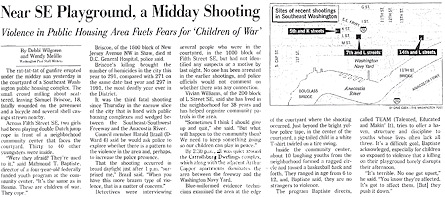
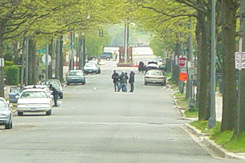 And yet the violence of the era probably fueled my interest in watching the city's redevelopment, to see neighborhoods that I had given up for lost in 1990 (such as Massachusetts Avenue east of Mt. Vernon Square) turn into luxury condo havens by the early 2000s. And it was why I began to watch--with no small sense of wonderment and even a little skepticism--as I started to hear in the late 1990s about the plans to "revitalize" the area south of the Southeast Freeway, an area that was a near-total No-Go for me from the time I moved to the south side of Capitol Hill in 1994 until my first furtive photographic forays by car in 2000 and 2003. (It's somewhat amazing now to realize that I did not actually put my feet on the ground at Third and K, SE, until the summer of 2005.)
And yet the violence of the era probably fueled my interest in watching the city's redevelopment, to see neighborhoods that I had given up for lost in 1990 (such as Massachusetts Avenue east of Mt. Vernon Square) turn into luxury condo havens by the early 2000s. And it was why I began to watch--with no small sense of wonderment and even a little skepticism--as I started to hear in the late 1990s about the plans to "revitalize" the area south of the Southeast Freeway, an area that was a near-total No-Go for me from the time I moved to the south side of Capitol Hill in 1994 until my first furtive photographic forays by car in 2000 and 2003. (It's somewhat amazing now to realize that I did not actually put my feet on the ground at Third and K, SE, until the summer of 2005.)
What you're looking at is a map of 64 violent deaths that occurred in Near Southeast between 1987 and 2004, when crack and other drugs and the accompanying violence nearly destroyed Washington, DC. And, if you go to the page itself, you will see the breakout of each death, with a name of the victim (when available), the date and location, and a brief thumbnail of what happened. The map and the data are interactive, so you can view just by year, or location, or type of death. It's not uplifting reading, but I really do recommend taking the time to go through it.
I can't pretend that this is a complete list; there are no online databases that easily offer up this data. I spent hours (and hours and hours) doing "grid searches" of the Washington Post and Washington Times electronic databases, having to search by street names and locations ("300 block of K street, SE; 300 block of L Street, SE; 3rd and K streets, SE; 1000 block of 3rd Street, SE;" etc. etc.). There's no guarantee that the newspapers mentioned every homicide, especially in the years when there were more than 400 murders across the city.
And, of course, this doesn't begin to capture the number of other crimes in the neighborhood during those years that didn't result in homicides--the robberies, the assaults, the non-fatal shootings and stabbings, etc.
It should be remembered that Near Southeast wasn't anywhere close to being the most dangerous area in the city; the 64 murders I've documented aren't even one percent of the 6,023 murders reported in this 18-year period (source: MPD, via the Internet Archive). So, as you look at this Near Southeast list, multiply it by 100 to imagine all the people who were killed in the city in those years.
 It turns me into an old codger to say it, but it's really true: those of you who didn't live in the DC area in the late 1980s and 1990s really have no concept of what Washington and its residents went through in those years. Even though large swaths of the city were considered "safe," with the bulk of the epidemic crime happening in certain neighborhoods, everyone was affected by the unrelenting drumbeat of murders and violence.
It turns me into an old codger to say it, but it's really true: those of you who didn't live in the DC area in the late 1980s and 1990s really have no concept of what Washington and its residents went through in those years. Even though large swaths of the city were considered "safe," with the bulk of the epidemic crime happening in certain neighborhoods, everyone was affected by the unrelenting drumbeat of murders and violence. Nights with seven murders in DC were unusual but not extraordinary; reading the paper each day with little more than tiny blurbs on most homicides (because they weren't really "news") made for a bleak landscape, even if you spent most of your time in sections of the city where day-to-day life seemed unaffected. DC's title of "Murder Capital of the World" was known far and wide, to the point that if you were traveling and told someone where you from, you'd often receive a sad shake of the head and hear, "It's such a shame what's happened to that lovely city."
It was a terrible time; and I say this as someone who was never affected by the violence personally in any way, other than knowing to avoid certain areas and be very careful during nights on the town. Looking back on it all now, through the lens of how far the city has come, makes the level of violence seem all the more incomprehensible and maddening. There's no question that I have become a little haunted over the past few weeks as I compiled this list, as my old generalized feelings of "quite a few people died on these streets over the years" have now been replaced with names, locations, a few photos, and gruesome details of executions and people in the wrong place at the wrong time.

 And yet the violence of the era probably fueled my interest in watching the city's redevelopment, to see neighborhoods that I had given up for lost in 1990 (such as Massachusetts Avenue east of Mt. Vernon Square) turn into luxury condo havens by the early 2000s. And it was why I began to watch--with no small sense of wonderment and even a little skepticism--as I started to hear in the late 1990s about the plans to "revitalize" the area south of the Southeast Freeway, an area that was a near-total No-Go for me from the time I moved to the south side of Capitol Hill in 1994 until my first furtive photographic forays by car in 2000 and 2003. (It's somewhat amazing now to realize that I did not actually put my feet on the ground at Third and K, SE, until the summer of 2005.)
And yet the violence of the era probably fueled my interest in watching the city's redevelopment, to see neighborhoods that I had given up for lost in 1990 (such as Massachusetts Avenue east of Mt. Vernon Square) turn into luxury condo havens by the early 2000s. And it was why I began to watch--with no small sense of wonderment and even a little skepticism--as I started to hear in the late 1990s about the plans to "revitalize" the area south of the Southeast Freeway, an area that was a near-total No-Go for me from the time I moved to the south side of Capitol Hill in 1994 until my first furtive photographic forays by car in 2000 and 2003. (It's somewhat amazing now to realize that I did not actually put my feet on the ground at Third and K, SE, until the summer of 2005.)I'll be writing in more detail in future entries about the violence in the Cappers, and at the Chapter III nightclub, but I wanted to post this overview first, to illustrate Near Southeast's descent to rock bottom for the people who might not be familiar with the recent history of the neighborhood, and also to remind everyone else of just what we as a city went through, as those memories become somewhat hazy in an era when some of the biggest battles are over funding for streetcars and dog parks. The city is certainly not without violence now, but the scale just doesn't compare.
And perhaps it'll also help clear up why I might not react with quite so much alarm when new residents write me concerned about a wave of auto thefts or other property crimes. I admit that it's somewhat unfair, but I think newcomers can talk to almost anyone who lived in Washington during the era of the Crack Wars and get the same reaction: You just have no idea.
UPDATE: Just to close the circle a bit, I should note that the reason I ended the dataset in 2004 is because, to the best of my knowledge, there have been no murders in Near Southeast since 21-year-old Terence Gathers died at Third and K on March 25 of that year.
|
Comments (0)
|
(This is just out from DDOT. I know *nothing* beyond this.) DDOT has announced today that they are launching multiple new parking pilot programs, to test out systems from a variety of vendors, that offer options such as pay-by-space and even sensors in parking spaces that can detect when a space is occupied or vacant.
For the area around Nationals Park, a company called ParkMobile will be offering a system where users, after signing up at the company's web site, can pay for parking via a cellphone or smartphone. (This system will also be in use for some spaces in Foggy Bottom and on Reservoir Road in Georgetown.)
This system--and three others that DDOT is evaluating--is expected to be in place by July 19, and will operate for 90 days, after which DDOT "will develop a long range strategy to upgrade its parking equipment and payment systems." It will be interesting to see if this helps cure some of the struggles with the current multispace meters, which do seem to be a bit balky (judging by the reports over the past few years in the DC Data Feeds).
More as I get it.
UPDATED to add the link to DDOT's press release, which gives more information on the other pilots in other sections of the city,
|
Comments (0)
More posts:
parking, Nationals Park
|
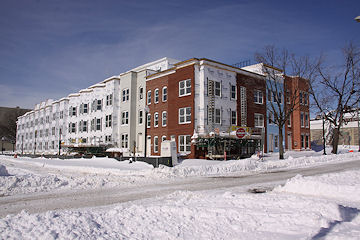
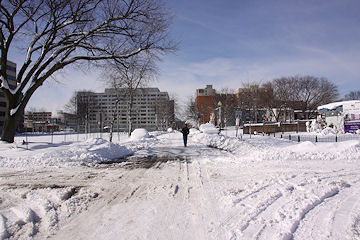
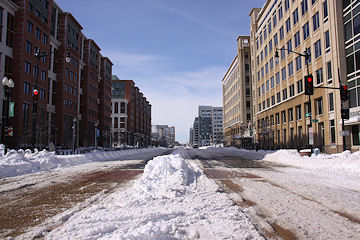
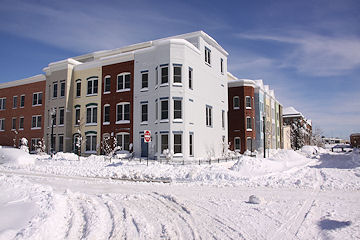
(These shots along Fourth Street--and more--are from February 7, 2010. There's plenty more that I never posted, because I got miffed that after spending about two hours trudging across the frozen tundra to get a pretty complete set of The Post-Blizzard Hood, we got smacked with the second one just a few days later, which made the snow in these shots look positively pedestrian.)
|
Comments (0)
More posts:
|
Via ANC 6B commissioner Norm Metzger, the Marines have sent out a one-page Comparison of Key Components chart, looking at the four possible sites for a new Marine barracks that appear to still be in the running (Square 882 is not on the chart, so this letter must have worked). There's not necessarily anything new in this table, but if you haven't slogged through the documents on the project's web site, it's a nice quick overview of the pros and cons (from the Marines' standpoint) of each location.
It does look like maybe they're looking at using their current Annex site at Seventh and L a little more intensely than it seemed in their early public workshops, with the possibility of expanding its footprint westward to Fifth Street, which would mean taking over the site where a new community center is to be built, and demolishing the parking garage built just east of Fifth in 2004. (But a new community center could be built as part of the "shared uses" scenario that the Marines are looking to enter into as part of their new plans to "create a win-win solution" for both the community and the USMC.) The baseball and soccer fields currently on the site would most likely be taken over in this scenario.
The Square 929/930 and 11th Street Exxon sites both would mean that the Virginia Avenue PARK AND Garden would have to be relocated, and though the document says that "replacement sites to be provided with goal of no net loss," the PARK AND garden's fans are fighting hard to not lose their current location.
The option of relocating the barracks to a site within the walls of the Navy Yard is also still on the table, though with the Navy talking about its own needs for an additional 700,000 square feet, it would seem difficult to reconcile the two expansion plans within the finite space of the WNY.
There probably won't be much news on the Barracks front until the "charrette" in September (details TBA), unless the Development Fairy makes a surprise appearance before then and finds a location that pleases all sides. For more background on the search up to now, read my previous entries.
(UPDATED to prevent hordes of Virginia Avenue Park fans from burning me in effigy for mistakenly referring only to the garden and not the entire park.)
|
Comments (0)
|
From DDOT, an announcement of a slew of weekday lane closures starting Monday (June 21) through July 23 as part of the ongoing 11th Street Bridges reconstruction. The closures can happen between 9:30 am and 3:30 pm Monday through Friday, and may include locations such as the 11th Street Bridges (including the ramps to and from the Southeast Freeway), DC-295, 11th Street between G and O, M Street, the SE Freeway near the 8th Street ramp, and other locations. See the entire list for specifics; the closures are taking place so that contractors can "conduct drainage inspection work, utility locating, barrier installation, equipment relocation, striping, sign work and various other construction activities."
|
Comments (0)
More posts:
11th Street Bridges
|
Via the BID's latest newsletter: "Share your stories of the historic Southeast DC neighborhood as we embark on the creation of a new Neighborhood Heritage Trail in the Capitol Riverfront. Cultural Tourism DC, in partnership with the Capitol Riverfront BID, is holding two community meetings for the public to share stories, bring photos and help shape the community's heritage trail. The first meeting will be on Wednesday, June 23rd at 7 PM at Arthur Capper Senior I, 900 Fifth Street, SE." See the flyer for more information.
(This is also a good time to mention that there won't be a Sunday Rearview Mirror this weekend--I have a good one on tap for next week, though.)
|
Comments (0)
More posts:
Capitol Riverfront BID, Rearview Mirror
|
Highlighting doings of interest over the next few days in convenient bullet form:
* Thursday is BID day, with three separate activities, starting with the Capitol Riverfront Farmers Market at New Jersey and M (up behind the fences) from 3 to 7 pm. Then there's the "Front Run Club," a new gathering for runners of all fitness levels that meets every Thursday night at 6 pm at Second and M. And of course it's movie night, as the Ultimate Underdog Movie Series continues with Shrek, with festivities starting at Second and M at 7:30 pm and the movie itself beginning around 8:45 pm. There will also be a hula hooping "Hoops Jam" before the movie.
* The Summer of Strasburg (SoS) continues with the phenom's second home start, on Friday night against the White Sox. Game time is 7:05 pm, with the gates at Nationals Park opening at 4:30 pm, and the swarms of sudden baseball fans descending on the neighborhood soon after. Be prepared for big crowds on Metro, roads, sidewalks, bike lanes, etc.
* Also at Nationals Park this weekend is "Nats U," which is being held on Saturday and offers women ages 15 and up "the opportunity to learn the ins and outs of America's favorite pastime from the experts at the Washington Nationals." For $50, female fans can sign up for either beginner or advanced sessions, and also receive tickets to Saturday's 4:10 pm game against the White Sox.
* There's also a series of additional events and promotions at the ballpark tied into Father's Day (you DID remember that Sunday is Father's Day, right?), which you can read about here.
|
Comments (0)
More posts:
Capitol Riverfront BID, Nationals Park
|
(Sunday Rearview Mirror is my new probably-not-weekly series where I'll look back at random pieces of Near Southeast history, giving readers who perhaps didn't know the area existed before the arrival of the Nationals some context and understanding of what this once "forgotten" neighborhood used to be like.)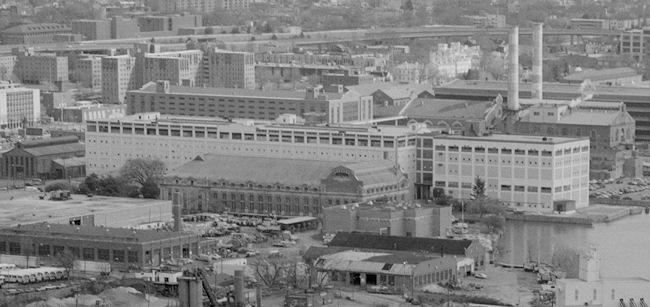
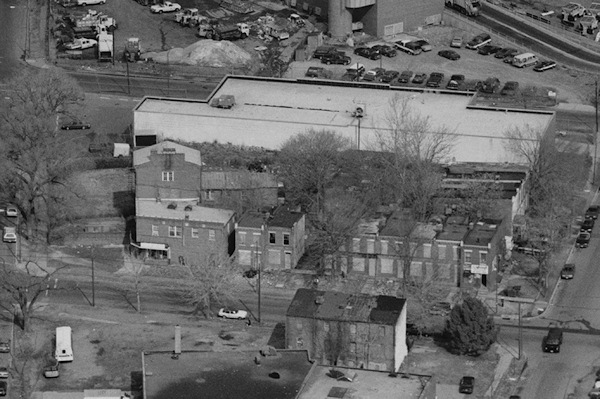 But I found a lot of other "lost" buildings as well, ones that I didn't remember and that probably weren't much to look at at the time, but that help to give a clearer view of what the neighborhood truly looked like just before its first "growth spurt" in 1999-2001 with the arrival of NAVSEA at the Navy Yard. The big finds were the seven or so old rowhouses just north of the (sparkling new) Navy Yard Metro station entrance on New Jersey Avenue, along with another 10 or so along L and Second Streets on what is now the Capitol Hill Tower/Courtyard block. (The Little Red Building did not stand alone since the dawn of time.) The car repair garage and other gritty low-rise buildings that stood where the 1100 New Jersey Avenue office building now is. And so on.
But I found a lot of other "lost" buildings as well, ones that I didn't remember and that probably weren't much to look at at the time, but that help to give a clearer view of what the neighborhood truly looked like just before its first "growth spurt" in 1999-2001 with the arrival of NAVSEA at the Navy Yard. The big finds were the seven or so old rowhouses just north of the (sparkling new) Navy Yard Metro station entrance on New Jersey Avenue, along with another 10 or so along L and Second Streets on what is now the Capitol Hill Tower/Courtyard block. (The Little Red Building did not stand alone since the dawn of time.) The car repair garage and other gritty low-rise buildings that stood where the 1100 New Jersey Avenue office building now is. And so on.
Though I've documented more than 150 buildings that have been demolished in Near Southeast since I first started photographing the area (initially in fall 2000 and then for real beginning in January 2003) I had taken enough brief drives through the neighborhood in the late 1990s to know that there were a few other long-standing sites that I didn't manage to capture before they were gone. This has bugged me for years, not only because I hate having missed them for my own archive but because I felt like they were an important part of what made up the old Near Southeast.
So it was with a fair amount of wonderment that I spent time over the past week pouring through images from the National Park Service's HABS, HAER and HALS archive of photos, available online thanks to the Library of Congress. The collection contains photos taken above New Jersey, Virginia, and Potomac avenues from helicopter height in 1992, and while I had seen some of these before, I had never downloaded the massive .TIFF images that allowed zooming in to such a degree that buildings and streetscapes became clearly visible.

Buildings I had longed to see documented in public domain photographs*, most of which were demolished in 1999 and 2000, now reappeared, albeit from overhead, in black-and-white and what and sometimes only in grainy depictions. But there they were: Tracks, the nightclub at First and M. The four Capper apartment buildings on Seventh Street and Virginia Avenue. The massive Building 159 at the Southeast Federal Center (seen above). The Washington Star warehouse just south of the freeway that I had driven past hundreds of times but never photographed.
 But I found a lot of other "lost" buildings as well, ones that I didn't remember and that probably weren't much to look at at the time, but that help to give a clearer view of what the neighborhood truly looked like just before its first "growth spurt" in 1999-2001 with the arrival of NAVSEA at the Navy Yard. The big finds were the seven or so old rowhouses just north of the (sparkling new) Navy Yard Metro station entrance on New Jersey Avenue, along with another 10 or so along L and Second Streets on what is now the Capitol Hill Tower/Courtyard block. (The Little Red Building did not stand alone since the dawn of time.) The car repair garage and other gritty low-rise buildings that stood where the 1100 New Jersey Avenue office building now is. And so on.
But I found a lot of other "lost" buildings as well, ones that I didn't remember and that probably weren't much to look at at the time, but that help to give a clearer view of what the neighborhood truly looked like just before its first "growth spurt" in 1999-2001 with the arrival of NAVSEA at the Navy Yard. The big finds were the seven or so old rowhouses just north of the (sparkling new) Navy Yard Metro station entrance on New Jersey Avenue, along with another 10 or so along L and Second Streets on what is now the Capitol Hill Tower/Courtyard block. (The Little Red Building did not stand alone since the dawn of time.) The car repair garage and other gritty low-rise buildings that stood where the 1100 New Jersey Avenue office building now is. And so on.I gathered the images on a new page, with lots of narration of what they show, along with in some cases early photos of mine that captured a few of the buildings before they disappeared. I'm really thrilled that these pictures finally provide the bridge I've wanted for so long between what Near Southeast looked like for many years and what I captured when I first started nosing around.
In future Rearview Mirror posts I'll be talking more about many of these sites, so I didn't go into great detail on the histories of the buildings themselves, but I'm really happy that now there will be images to accompany the stories. I doubt most people will be as excited by these shots as I have been, but I still really recommend taking a few minutes to go through them.
* The "public domain" distinction is important, because I'm sure that photos of many of these buildings exist in other archives, but since they can't be shared online without my ponying up a bunch of $$, they're not of much use to me here.
|
Comments (0)
More posts:
Rearview Mirror
|
For those of you who might use the little stretch of O Street, SE between 11th and 12th (under the 11th Street Bridges), a travel advisory: "Weekdays June 15 to 24, weather permitting, contractors for the District of Columbia Department of Transportation (DDOT) will reduce O Street SE between 11 and 12 Street SE to one shared-lane for both directions of traffic and flagmen alternating traffic flow to allow sewer line work related to the 11th Street Bridge Project. This reduction of O Street travel lanes will occur from Monday through Friday from 9:30 a.m. to 3:30 p.m. and is subject to change due to weather or other unforeseen conditions."
|
Comments (0)
More posts:
11th Street Bridges, East of 11th Street
|
It's all still rumor at this point, but on Friday night USA Today's baseball writer Bob Nightengale tweeted that Commissioner Bud Selig will be announcing on Wednesday that Kansas City will host the 2012 MLB all-star game, followed by the Mets in 2013, Minnesota in 2014, and then DC in 2015. (He then followed up to say that only Kansas City will be announced Wednesday, and that the other sites will be announced one year at a time.)
The Post's baseball writer Adam Kilgore contacted Stan Kasten today, and wrote: "In a telephone conversation Saturday morning, Team President Stan Kasten said the Nationals have not been informed by the league about hosting the 2015 All-Star Game but remain confident Nationals Park will house the game in the near future. 'We haven't heard anything from anybody about it,' Kasten said. 'We're certainly hopeful it comes to Washington. We continue to push to get an All-Star Game, and I'm sure we will soon.' Kasten's comments by no means challenged the veracity of last night's report. Washington, a high-profile market with a new stadium, makes perfect sense as an All-Star Game host. Sooner or later, the District was going to get the game."
So, no confirmation, and perhaps not one for a while to come, but as the previous sentence says, it's not a big shocker that DC would be in the queue.
|
Comments (0)
More posts:
Nationals Park
|
The agenda is now posted for Monday's ANC 6D meeting, and it does have a few Near Southeast-related items on it. So it follows logically that I'm not going to be able to be there.
Items include: A report from the housing authority on a request for a zoning time extension for the planned (and long-delayed) community center at Fifth and K streets, SE; an update on the upcoming second phase of Capitol Quarter (which EYA tells me resulted in 11 reservations in the first 15 days); an update on the stadium Traffic Operations and Parking Plan, presumably coming out of the two recent public meetings; and reports/possible votes on Justin's Cafe's proposed sidewalk cafe and the proposed "Harry's" liquor store at New Jersey and I, both of which you can get more detail on from my report on last week's ABC subcommittee meeting.
The meeting is at 7 pm at St. Augustine's church at Sixth and M streets, SW--they're trying to get moved to their space in the new Waterfront buildings, but it still hasn't happened.
I'm going to try to find out more about the community center request, though I imagine there isn't much more to it other than DCHA says it doesn't still have the money to build it yet and so can't meet the deadline that was set in the zoning PUD (planned unit development) for Capper. The time frame for the community center has already been extended once, and in fact DCHA told the Zoning Commission last year that they fully expected that new deadline of filing building permits by Jan. 1, 2011, would be too short and that they'd be back to request another extension. Which appears to be what's transpiring.
|
Comments (0)
|
* There's been discussion on Twitter about this, but I guess it needs to be elevated to the blog--last week a sign went up at Five Guys on Second Street saying that it would be closed for maintenance from June 4 - 14. It certainly looks like they're doing work in there, and I doubt that if it were closing for good they would have given a timeframe, but I know people are nervous, given the dearth of other choices. I don't know any additional details, so feel free to post in the comments if you have any scuttlebutt to add.
* The BID's summer outdoor movie season continues tonight (Thursday) with Forrest Gump. Festivities start at Second and M streets, SE, at 7:30 pm, though the movie itself doesn't begin until after sundown. (I'm already making plans for the July 8 showing of Star Wars--if anyone wants to hang out with me, I can regale you young whippersnappers with tales of seeing it at the Uptown in the summer of 1977, and how my mother almost made us leave because she couldn't quite get hip to robots walking around in sand dunes.) Aak! They've taken it off the list, and replaced it with Legally Blonde! Waah!
* From DDOT, a notice about some lane closures this weekend on DC-295, which are technically outside my iron-clad boundaries but which do have to do with the 11th Street Bridges project: "From 9 pm on Friday, June 11 into the evening of Sunday, June 13, DDOT contractors will close one travel lane in each direction of DC 295 between the 11th Street Bridge and Pennsylvania Avenue. The work is part of the 11th Street Bridge Project. In addition, there will be single lane closures Saturday on both the northbound and southbound sides of Kenilworth Avenue (DC 295) at Eastern Avenue. This work if related to the replacement of the Eastern Avenue Bridge." They warn that there could be backups of two miles or more.
* I didn't really blog about Wednesday's phenomenal debut of Stephen Strasburg (though I was at the game and Tweeted here and there) because I figured that there might be one or two other outlets where you could get the latest. But it will be interesting to watch the impact on the neighborhood if he continues to pitch like an alien being--will all of his games bring huge crowds? Will attendance start to lift at games when he isn't playing? Will game-day traffic and transit issues that haven't really been at the forefront become a sore point if more people come to games more often? And will restaurants and bars (and retailers and office tenants and residents) start thinking a little more about being near the ballpark? The Summer of Strasburg (SoS) could get quite interesting....
QUICK ADD: From the Nats: "The Washington Nationals will host their annual blood drive, in partnership with Inova Blood Donor Services, this Saturday, June 12 in the Nationals Park Conference Center from 8:00 a.m. to 5:00 p.m. In addition to helping save a life, blood donors will receive two tickets to a future Nationals game, a limited edition Build-A-Bear Workshop bloodhound and the opportunity to take an exclusive behind-the-scenes tour of Nationals Park." There will be a second drive on Aug. 28, from 8 am to 2 pm.
|
Comments (0)
|
Both Metro and DDOT (and Dr. Gridlock) have issued advisories about the expected crush of humanity along South Capitol Street tomorrow (Tuesday) as a sellout, standing-room-only, selling-single-seats-in-luxury-boxes crowd heads to Nationals Park to watch the Major League debut of Stephen Strasburg (perhaps you've heard of him). First pitch is at 7:05 pm, but the gates will be opening at 4:30 pm (which is also when the day-of-game $5 seats go on sale at the box office). So be prepared for a rush hour that might be just a teensy bit different than usual.
No pressure, kid!
PS: And if you aren't heading for the ballpark, you can still get your fill without leaving your easy chair: ESPN will be broadcasting live from Nats Park starting Tuesday at 3:30 pm with a special edition of ESPN Baseball Tonight. The MLB Network will also be live from Nationals Park with MLB Live at 5:30 p.m, and both networks will also do post-game shows from DC. The game will be shown on MASN2.
UPDATE II: I'm getting out of practice on this. I should have included a link to my Stadium Parking Options map, which shows both the official Nats lots and the many unofficial cash lots that have sprouted up. Though, of course, Metro really is the way to go, especially for an evening game, given how heavy the volume will be of stadium drivers combined with the regular rush hour traffic coming off the SW Freeway at South Capitol.
UPDATE III: For newcomers landing here today off a Google search or some such, here's my Nationals Park page, with an FAQ, if you scroll down, and a lot of photos showing how the park came to be.
|
Comments (0)
More posts:
Nationals Park
|
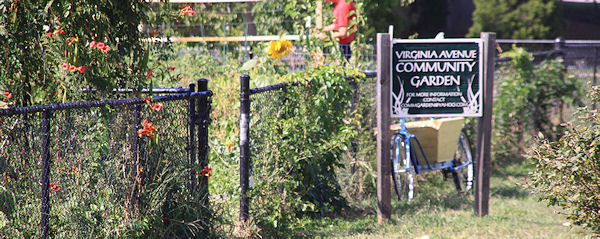
Monday's Post covers for the first time the Marines' search for a new barracks site, from the point of view of the residents who maintain the Virginia Avenue Garden at Ninth and Potomac, which could be relocated to another section of the park if the Marines choose the area east of Eighth Street. "But the community gardeners, in Capitol Hill style, are mobilizing to save their home. [...] [T]he gardeners say it has taken them years to amend the unforgiving clay soil with nutrients."
The article quotes Capt. Lisa Lawrence as saying, "Our goal is not to take over a neighborhood," and that the Marines are looking at every option. "But we won't be able to please everybody."
Also mentioned is that the DCHA/Square 882 site at Seventh and L "has moved to the bottom of the list," according to Lawrence (presumably in response to this letter). And there's information about what appears to be Tommy Wells's preferred solution, that he's "fighting to keep the garden alive by urging the Marines to tear down the parking lot next to the annex and rebuild it underground, freeing space for a new barracks. Lawrence said a parking lot under a barracks would probably pose a structural challenge. 'We don't have a strong negotiating position," Wells said. "Who wants to take on the U.S. Marines?'"
If you want more background on the Marines' search, I've written a word or two on it over the past few months.
UPDATE: I meant to also include this link to a recent Hill is Home post on the history of the park, tied to whether or not the Marines' plans would conflict with the L'Enfant Plan. (Though I'm not sure Monsieur L'Enfant envisioned a big, honking, elevated freeway, either.)
|
Comments (0)
More posts:
600 M/Square 882/Old Capper Seniors, Barracks, The Bixby, Capper, The Bixby, Virginia Ave Park
|
(For someone who graduated from college with a degree in history, I have done a lousy job over the years of documenting the history of Near Southeast with anything approaching the zeal of my coverage of its present and future. I can offer no good excuses, but I'm going to begin to rectify this with a new series, "Sunday Rearview Mirror." I don't pretend to have the level of knowledge or experience of the pre-ballpark era as those who passed through Near Southeast during those years, but hopefully by taking the time every so often to highlight and describe events from the past I can help make sure that the new residents and workers who only recently heard of Near Southeast have some awareness of the people and events that came before them.)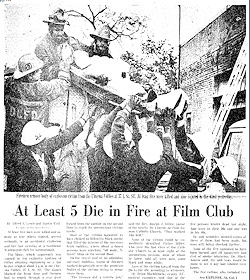 On Oct. 24, 1977, an explosion on the ground floor triggered by cleaning chemicals started a fire, with flames quickly consuming carpeting and wall hangings, blocking the exit for the patrons who had been in the 50-seat second floor theater. The fire never reached the second floor, but the smoke quickly became overpowering. However, a door that led to the roof was padlocked, and the windows had been replaced with cinderblocks. According to the Washington Post's account, "most of the victims were found in the orange-and-black theater seats [...] and may have been overcome by the smoke before they realized what was happening."
On Oct. 24, 1977, an explosion on the ground floor triggered by cleaning chemicals started a fire, with flames quickly consuming carpeting and wall hangings, blocking the exit for the patrons who had been in the 50-seat second floor theater. The fire never reached the second floor, but the smoke quickly became overpowering. However, a door that led to the roof was padlocked, and the windows had been replaced with cinderblocks. According to the Washington Post's account, "most of the victims were found in the orange-and-black theater seats [...] and may have been overcome by the smoke before they realized what was happening."
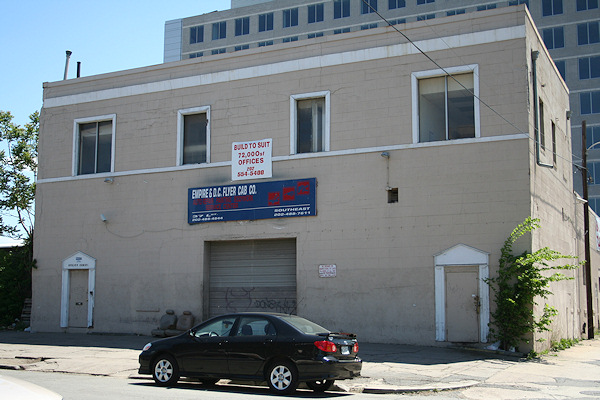 Within a year or the fire, Oates opened "The Follies" at its new location at 24 O St., SE, where it operated until it was demolished with many other gay nightclubs in May 2006 to make way for Nationals Park. Somewhat amazingly, the building where the Cinema Follies fire took place, which was not all that heavily damaged, still stands today, on L Street directly across from the under-construction 1015 Half office building. It's currently home to a cab company.
Within a year or the fire, Oates opened "The Follies" at its new location at 24 O St., SE, where it operated until it was demolished with many other gay nightclubs in May 2006 to make way for Nationals Park. Somewhat amazingly, the building where the Cinema Follies fire took place, which was not all that heavily damaged, still stands today, on L Street directly across from the under-construction 1015 Half office building. It's currently home to a cab company.
It was in the 1970s that the western edge of Near Southeast became home to a new entertainment district for the city's gay residents, with its remoteness and lack of nearby residences allowing some measure of freedom for a culture that was only just beginning to step out of the closet. The area between South Capitol and First streets--with clubs like the Lost and Found, Club Baths II, Grand Central, Waaay off Broadway and Washington Square--became home not only to nightclubs with dancing and music but also but bathhouses, x-rated movie cinemas, and strip clubs. One of the new clubs was the Cinema Follies, which opened in 1975 at 37 L St., SE, showing x-rated gay films.
 On Oct. 24, 1977, an explosion on the ground floor triggered by cleaning chemicals started a fire, with flames quickly consuming carpeting and wall hangings, blocking the exit for the patrons who had been in the 50-seat second floor theater. The fire never reached the second floor, but the smoke quickly became overpowering. However, a door that led to the roof was padlocked, and the windows had been replaced with cinderblocks. According to the Washington Post's account, "most of the victims were found in the orange-and-black theater seats [...] and may have been overcome by the smoke before they realized what was happening."
On Oct. 24, 1977, an explosion on the ground floor triggered by cleaning chemicals started a fire, with flames quickly consuming carpeting and wall hangings, blocking the exit for the patrons who had been in the 50-seat second floor theater. The fire never reached the second floor, but the smoke quickly became overpowering. However, a door that led to the roof was padlocked, and the windows had been replaced with cinderblocks. According to the Washington Post's account, "most of the victims were found in the orange-and-black theater seats [...] and may have been overcome by the smoke before they realized what was happening."Nine people died as a result of the fire, making it the deadliest fire in Washington DC up to that time, a mark that stood until a fire at an unlicensed group home on Lamont Street, NW, killed 10 in April 1979. Identification of those who died at the Follies was hampered by the fact that, as the Post reported, "Many homosexuals do not carry identification when they visit homosexual gathering places," being "wary about the possibility of jeopardizing jobs or social position by having nonhomosexuals learn of their sexual orientation" in case their presence at club might be made public "through a police raid or other event."
(An interesting sidelight to the issue of identification was a column by Post ombudsman Charles Seib soon after the fire, questioning the Post's decision to not use the full names of some of those who died and no names at all of the injured. The column quoted then-Managing Editor Howard Simon as saying that the paper's main motivation was "compassion for the wives and children" [since some of the victims were married] but Seib went on to ask whether this approach had the effect of "underscoring the stigma of homosexuality, of shoving it back in the closet at a time when efforts are being made to bring it out and address it as a social fact?" This is an issue that papers still clearly struggle with, even today.)

William Oates, the manager of the club, was eventually fined $650 in 1979 for violating four building codes, though city officials stated that Oates "did everything possible" to try to comply with the laws, but poor city record keeping and poorly written codes made it difficult. (The city did work to strengthen its codes in the wake of the fire.) However, nearly eight years after the fire, in September of 1985, families of four of the victims were awarded more than $1.5 million in a civil suit against the club's owners.
 Within a year or the fire, Oates opened "The Follies" at its new location at 24 O St., SE, where it operated until it was demolished with many other gay nightclubs in May 2006 to make way for Nationals Park. Somewhat amazingly, the building where the Cinema Follies fire took place, which was not all that heavily damaged, still stands today, on L Street directly across from the under-construction 1015 Half office building. It's currently home to a cab company.
Within a year or the fire, Oates opened "The Follies" at its new location at 24 O St., SE, where it operated until it was demolished with many other gay nightclubs in May 2006 to make way for Nationals Park. Somewhat amazingly, the building where the Cinema Follies fire took place, which was not all that heavily damaged, still stands today, on L Street directly across from the under-construction 1015 Half office building. It's currently home to a cab company.I plan to write more Rear-View Mirror entries in the future about the neighborhood's past as a nightclub district, but until then, this 2003 pamphlet by the Rainbow History Project gives a great overview of the clubs that used to be such an integral part of Washington's gay culture. Hard to believe that, when the pamphlet was written, the authors had no idea how little time the existing clubs had left.
|
Comments (0)
|
Over the next few weeks, weather permitting, workers will be demolishing bridge spans that runs above N Street, SE (that little connector road between 12th Street and the Navy Yard gate on 11th). This is part of the 11th Street Bridges project, and is the continuation of the demolition of the no-longer-needed ramps to and from RFK. (Note that the spans that still carry 11th Street Bridge traffic aren't coming down!) Here's the specifics on time-frames and lane closures:
""Sunday through Thursday from June 6 through July 1, weather permitting, contractors for the District of Columbia Department of Transportation (DDOT) will perform bridge demolition work above N Street SE requiring overnight closures of the street between the 12th Street SE and the gate of the Navy Yard on 11th Street SE. The closures will occur each night from 8 p.m. to 5 a.m. the next morning with a signed detour provided.
"Also during this timeframe, the following lane closures will be instituted for related bridge demolition activities:
"* The left lane will be closed on the ramp from Southeast/Southwest Freeway to I-295 South/Martin Luther King Jr. Avenue continuing across the outbound 11th Street bridge and ending prior to merge area with I-295.
"* The left lane will be closed across the inbound 11th Street bridge beginning on I-295 north near Howard Road and ending past the M Street/12th Street exit ramp.
"All of these closures may be subject to change due to weather or other unforeseen conditions."
Here's a zoom in on the Google Maps satellite view if you need some visualization assistance. It's the first and third (from the left) of the four "spans" above N Street are the ones that go to and from RFK. I also wonder if this means that the big embankment that runs along 11th Street between M and N is coming down--I would think so, since it's now an unused stub.
|
Comments (0)
More posts:
11th Street Bridges, Navy Yard
|
In an article from Friday's Post about how hard Capitals owner Ted Leonsis has worked to get his team into the NHL Winter Classic, this fun tidbit about the machinations behind the expected arrival of the outdoor New Years Day game in DC (or Baltimore) in 2013 or 2014:
"Another advocate for a D.C. venue is Nationals President Stan Kasten, who confirmed his team is prepared to make a hard charge to put on the Winter Classic. That aggressive bid will be led by Mark Lerner, a minority owner of the Capitals whose family owns the Nationals. Kasten said the Nationals have already made a detailed presentation to the NHL, complete with schematics showing where the rink would be placed. Kasten also said officials from the league paid Nationals Park a visit earlier this year when Washington was being considered for the 2011 game.
"'Let's face it, Nationals Park is the premier venue in the most important city in the world,' Kasten said. 'I can't imagine it being anywhere but Nationals Park.'"
The article also quotes NHL league commissioner Gary Bettman, on being asked if the connection of Nationals owner Mark Lerner to the Capitals (he's a minority owner) helps the case for Nats Park: "It certainly doesn't hurt."
The article does say, though, that the NHL prefers football stadiums, since they can hold more fans. Nationals Park would hold about 42,000, while FedEx Field has nearly 92,000 seats for Redskins games.
(There's also a bit more detail in a Thursday Capitals Insider blog post.)
|
Comments (0)
More posts:
Nationals Park, winterclassic
|
A reminder that on Saturday (June 5) is "WPArade! An Art Parade in the Capitol Riverfront" (their exclamation point, not mine), presented by the Washington Project for the Arts. It's described as "an extravaganza of artists connecting with community to create a moving visual spectacle of art and culture" with "[a]rtists, performers, musicians, and visual arts organizations will come together in Washington's first Art Parade to display moving art, floats, placards, portable sculpture and street performance along Half Street SE." It starts at Half and M at noon, with a midblock stop for performances before culminating in a party alllllllllll the way down at the Bullpen at N Street, running until 3 pm. All portions are free and open to the public; see a list of the artists here.
|
Comments (0)
More posts:
Capitol Riverfront BID, Fairgrounds/Bullpen
|
2398 Posts:
Go to Page: 1 | ... 7 | 8 | 9 | 10 | 11 | 12 | 13 | 14 | 15 ... 240
Search JDLand Blog Posts by Date or Category
Go to Page: 1 | ... 7 | 8 | 9 | 10 | 11 | 12 | 13 | 14 | 15 ... 240
Search JDLand Blog Posts by Date or Category



